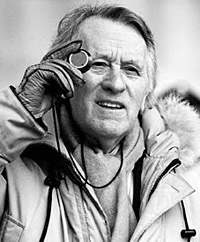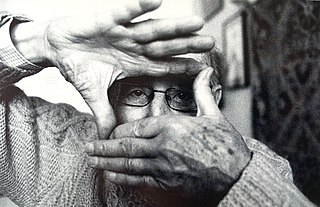
Gilbert Taylor, B.S.C. was a British cinematographer, best known for his work on films such as Dr. Strangelove, A Hard Day's Night, Repulsion (1965), The Omen (1976), and Star Wars (1977). In the course of his career, he collaborated with directors like Roman Polanski, Stanley Kubrick, Alfred Hitchcock, and Mike Hodges. He was nominated for two BAFTA Awards, and received a Lifetime Achievement Award from the British Society of Cinematographers.

Jack Cardiff, was a British cinematographer, film and television director, and photographer. His career spanned the development of cinema, from silent film, through early experiments in Technicolor, to filmmaking more than half a century later.

Frederick William Francis was an English cinematographer and film director.

Frederick A. YoungOBE, BSC was a British cinematographer. He is probably best known for his work on David Lean's films Lawrence of Arabia (1962), Doctor Zhivago (1965) and Ryan's Daughter (1970), all three of which won him Academy Awards for Best Cinematography. He was often credited as F. A. Young.

Ralph Douglas Vladimir Slocombe OBE, BSC, ASC, GBCT was a British cinematographer, particularly known for his work at Ealing Studios in the 1940s and 1950s, as well as the first three Indiana Jones films. He won BAFTA Awards in 1964, 1975, and 1979, and was nominated for an Academy Award on three occasions.
Christopher George Joseph Challis BSC, FRPS was a British cinematographer who worked on more than 70 feature films from the 1940s onwards.
Chris Menges BSC, ASC is a British cinematographer and film director. He is a member of both the American and British Societies of Cinematographers.

Wolfgang Suschitzky, BSC, was an Austrian-born British documentary photographer, as well as a cinematographer perhaps best known for his collaboration with Paul Rotha in the 1940s and his work on Mike Hodges' 1971 film Get Carter.
William Ashman Fraker, A.S.C., B.S.C. was an American cinematographer, film director and producer. He was nominated five times for the Academy Award for Best Cinematography. In 2000, he received a Lifetime Achievement Award from the American Society of Cinematographers (ASC) honoring his career. Fraker graduated from the USC School of Cinematic Arts in 1950.

Walter Lassally was a German-born British cinematographer. He won the Academy Award for Best Cinematography in 1965 for the film Zorba the Greek.
Owen Roizman was an American cinematographer. He received five Academy Award nominations for Best Cinematography, for the films The French Connection (1971), The Exorcist (1973), Network (1976), Tootsie (1982), and Wyatt Earp (1994). He served on the Board of Governors of the Academy of Motion Picture Arts and Sciences and was president of the American Society of Cinematographers.

Stephen Goldblatt, A.S.C., B.S.C. is a South African-born British cinematographer, noted for his work on numerous high-profile action films, including the first two entries in the Lethal Weapon series, as well as for his recent collaborations with director Mike Nichols and Tate Taylor.
The British Society of Cinematographers is an organisation formed in 1949 by Bert Easey, the then head of the Denham and Pinewood studio camera departments, to represent British cinematographers in the British film industry.
Alexander Thomson BSC was a British cinematographer.
Gerry Fisher, B.S.C. was an English cinematographer.
Peter Biziou BSC is a British cinematographer. He received the Academy Award and BAFTA Award for Best Cinematography for Mississippi Burning (1988). He received a BAFTA Award nomination for The Truman Show (1998).
Oswald Norman Morris, BSC was a British cinematographer. Known to his colleagues by the nicknames "Os" or "Ossie", Morris's career in cinematography spanned six decades.
Ronald Charles Taylor BSC was a British cinematographer, best known for his collaborations with directors Richard Attenborough and Dario Argento. Throughout his career, he was nominated for two BAFTA Awards for Best Cinematography and won an Academy Award for his work on Gandhi (1982), which he shared with Billy Williams.
Nick McLean, Sr.,, full name George Nicholas McLean, is an American cinematographer, best known for his work on the television shows Friends, Joey, Cybill, and Evening Shade.
John Laurence Wilcox, BSC was a British cinematographer. He frequently worked with director Freddie Francis and photographed many popular British films, including Carve Her Name with Pride, Summer Holiday and Dr. Who and the Daleks.







